| |
|
|
Deorum injuriae diis curae (the gods
take care of injuries to the gods)
|
|
Emperor Tiberius (42 BC -AD 37), cited
by Tacitus, Annals of Imperial Rome
|
Before Christianity, Greek and Roman believers had been content
to allow their gods to take care of themselves if they were
insulted. Early Christians had taken full advantage of this
tolerance to revile those gods. But Christianity was not willing
to extend the same sort of tolerance when it took over the reins
of imperial power. It was no longer permissible to believe in
other gods, and neither was it permissible not to believe in
God at all. No dissent or criticism could be tolerated. All
citizens had to come into the Christian fold, whether they wanted
to or not. To deny Christianity was to blaspheme it, and blasphemy
was a crime against God.
The codification of Roman law carried out by the Christian
Emperor Justinian in the sixth century was clear. According
to his Corpus Juris Civilis, famine, earthquakes and
pestilence were attributable to God's wrath, induced by a failure
to punish blasphemers. This was exactly the opposite of what
had been believed 300 years earlier, when Christians had been
blamed for the wrath of the gods. The difference was that now
the punishment for blasphemy, fixed by the Code of Justinian,
was death. By the time the Holy Roman Empire came into being
in AD 800, ideas such as this were accepted throughout Europe.
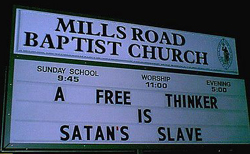  Freethought,
the rejection of supernatural religion, along with its assumptions
and authorities, developed slowly. Dissenting voices were silenced
by the threat of death, so they remained silent through the
Middle Ages. The path that led to these voices being permitted
to speak once again started during the Renaissance. It became
possible to deny the doctrines of Christianity step by step
over several centuries. We have seen that various proto-Protestant
groups doubted mainstream Christian teachings from the twelfth
century. Their Protestant successors denied various Roman doctrines
from the sixteenth. Anabaptists and Adventists denied even more.
In this section we will trace the path by which it became permissible
to express even greater degrees of religious doubt, and by which
people in the twentieth century came to enjoy the same freedoms
that their ancestors enjoyed before the advent of Christianity. Freethought,
the rejection of supernatural religion, along with its assumptions
and authorities, developed slowly. Dissenting voices were silenced
by the threat of death, so they remained silent through the
Middle Ages. The path that led to these voices being permitted
to speak once again started during the Renaissance. It became
possible to deny the doctrines of Christianity step by step
over several centuries. We have seen that various proto-Protestant
groups doubted mainstream Christian teachings from the twelfth
century. Their Protestant successors denied various Roman doctrines
from the sixteenth. Anabaptists and Adventists denied even more.
In this section we will trace the path by which it became permissible
to express even greater degrees of religious doubt, and by which
people in the twentieth century came to enjoy the same freedoms
that their ancestors enjoyed before the advent of Christianity.
Blasphemy
  The
term blasphemer was applied to anyone who disagreed
with the current line taken by the Church hierarchy. Blasphemers
were liable to a range of punishments that tended to stop them
repeating their offence. For trivial cases they had their lips
cut off, or were burned through the tongue, or had their tongue
cut out, or torn out. For more serious cases they could also
be sentenced to a quick death (execution) or a slow one (imprisonment
on a diet of bread and water). St Thomas Aquinas regarded blasphemers
as heretics, and heretics as blasphemers. For him heresy and
blasphemy amounted to the same thing. Like a long line of influential
theologians before him, stretching back to St Augustine, he
advocated the death penalty for offenders1,
and this was the prevailing view of Protestant as well as Roman
Catholic scholars. The consensus was that there was no choice
in the matter because God had been explicit: The
term blasphemer was applied to anyone who disagreed
with the current line taken by the Church hierarchy. Blasphemers
were liable to a range of punishments that tended to stop them
repeating their offence. For trivial cases they had their lips
cut off, or were burned through the tongue, or had their tongue
cut out, or torn out. For more serious cases they could also
be sentenced to a quick death (execution) or a slow one (imprisonment
on a diet of bread and water). St Thomas Aquinas regarded blasphemers
as heretics, and heretics as blasphemers. For him heresy and
blasphemy amounted to the same thing. Like a long line of influential
theologians before him, stretching back to St Augustine, he
advocated the death penalty for offenders1,
and this was the prevailing view of Protestant as well as Roman
Catholic scholars. The consensus was that there was no choice
in the matter because God had been explicit:
And he that blasphemeth the name of the Lord, he shall surely
be put to death, and all the congregation shall certainly
stone him: as well the stranger, as he that is born in the
land, when he blasphemeth the name of the Lord, shall be put
to death.
Leviticus 24:16
The limited nature of the biblical definition of blasphemy
was ignored completely, while the point was taken to be that
to ignore blasphemy would be contrary to the word of God, and
therefore a sin in itself. Many Christians advocated death for
blasphemers by stoning, in accordance with Leviticus, but the
law never adopted this method of execution, despite its being
advocated by bishops and judges. Stoning was, however, frequently
adopted by crusaders and other Christian mobs, who tended to
have more trust in the Bible's requirements.
|
The biblical penalty for blasphemy was
stong to death.
Leviticus 24:14: "Take the blasphemer outside the
camp. All those who heard him are to lay their hands on
his head, and the entire assembly is to stone him."
|
|
|
Since anyone who disagreed with the Church was necessarily
guilty of blasphemy, and therefore liable to the death penalty,
there were few people who would voluntarily come forward to
declare themselves. There were however, over the centuries,
a number of people who were insane, or mentally deficient, or
in receipt of revelation from gods other than the Christian
one, who made blasphemous statements and paid with their lives.
There were also few people who were so young, sheltered and
innocent that they did not understand the consequences of speaking
honestly in a traditional Christian society, until it was too
late.
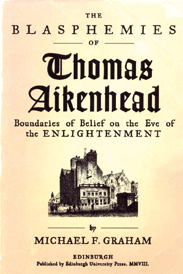  In
December 1696, an 18-year-old medical student at Edinburgh University
called Thomas Aikenhead was indicted for blasphemy . The indictment
read: In
December 1696, an 18-year-old medical student at Edinburgh University
called Thomas Aikenhead was indicted for blasphemy . The indictment
read:
That ... the prisoner had repeatedly maintained, in conversation,
that theology was a rhapsody of ill-invented nonsense, patched
up partly of the moral doctrines of philosophers, and partly
of poetical fictions and extravagant chimeras: That he ridiculed
the holy scriptures, calling the Old Testament Ezra's fables,
in profane allusion to Esop's Fables; That he railed on Christ,
saying, he had learned magick in Egypt, which enabled him
to perform those pranks which were called miracles: That he
called the New Testament the history of the impostor Christ;
That he said Moses was the better artist and the better politician;
and he preferred Muhammad to Christ: That the Holy Scriptures
were stuffed with such madness, nonsense, and contradictions,
that he admired the stupidity of the world in being so long
deluded by them: That he rejected the mystery of the Trinity
as unworthy of refutation; and scoffed at the incarnation
of Christ.
He was not permitted legal counsel and despite recanting was
condemned to death. He appealed, but on 7 January, 1697, the
Privy Council ruled that they would not grant a reprieve unless
the church interceded for him. The Church of Scotland’s
General Assembly, sitting in Edinburgh at the time, urged "vigorous
execution" to curb "the abounding of impiety and profanity
in this land". The sentence was therefore confirmed. There
seems to have been no legal basis for the sentence2,
but the lad swung from the gibbet anyway, the last person in
Britain to be executed by the State for his religious beliefs.
|
In 1697 the same year as Aikenhead was
hanged, the Government passed
An Act Against Atheism and Blasphemy for the Massachusetts
Bay Colony, under King William III.
Punishments included sitting in the pillory, whipping
and having the tongue bored through with a red hot iron,
and sitting on the gallows with a rope around the neck,
as well as up to six months in gaol.
|
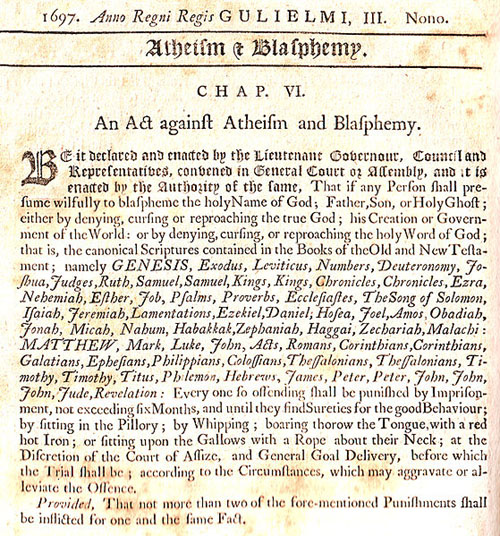 |
Genuine blasphemers have played little part in the development
of Christian thought, but as we are about to see, alleged blasphemers
have played a major role. All of the following have been regarded
as blasphemers: apostates,
humanists, pantheists,
Unitarians, deists,
atheists.
Apostasy
An apostate is someone who decides to leave a religion to which
he or she has belonged. Where people had been forcibly converted
to Christianity, they often secretly continued to practice their
original faith. To Christian eyes this constituted abandoning
the Christian Church, and was thus constituted apostasy. Despite
the risks, pockets of people throughout Christendom secretly
managed to hang on to their original religions for many centuries,
even though they must have known that they were likely to be
killed if the Church authorities found out. Well into the Middle
Ages remote European communities were still worshipping the
gods of their Celtic and Teutonic ancestors in private. In public,
everyone was obliged to subscribe to the current version of
Christian orthodoxy.
Christian authorities had to keep a close watch on other categories
of potential defector, since Christians were frequently converted
to other religions if they had the opportunity to find out about
them. This type of apostasy was common on Christendom's territorial
borders where ideas were freely exchanged, but rare in the hinterland
where ideas were firmly controlled. Christians who travelled
beyond Europe were at risk from new ideas, and the Church has
long been embarrassed by the fact that many crusaders, fired
by Christian zeal to kill God's Muslim enemies, had ended their
lives as Muslims, killing God's Christian enemies.
Unlike Islam, Judaism did not seek converts from other religions,
so there was less of a threat from Jewish beliefs. Even so,
Judaism won the occasional convert, though such converts were
not likely to enjoy a very full life with their new allegiance.
In thirteenth century England a young deacon fell in love with
a Jewess and converted to Judaism. For this he was degraded
and excommunicated by a Church Council at Oxford in 1222, and
then burned alive3.
In 1267 Pope Clement IV ordered the Inquisition to proceed against
Christians who converted to Judaism. Three years later two converts
were killed at Weissenberg in Alsace. Presumably the danger
continued, for the papal bull authorising the Inquisition to
investigate such cases was reissued in 1274, 1288 and 1290.
Since it was the practice in most mainstream Churches to baptise
everyone into the faith as an infant, anyone could be found
guilty of apostasy if they elected either to follow another
religion, or to deny all religion. All apostasy was blasphemy,
and the penalty for it was death, as required by God. Theologians
pointed out that the bible confirmed that death was the appropriate
penalty ”And it shall come to pass, that every soul, which
will not hear that prophet, shall be destroyed from among the
people” (Acts 3: 23).
Humanism
Until the Renaissance the Church was able, more or less, to
enforce its monopoly of belief. But during the Renaissance,
humanism flourished. Humanists emphasised the rights, abilities
and achievements of mankind, but did not explicitly deny God.
Indeed many key humanists were clerics. Humanism was the most
liberal position tolerated at the time — though all humanists
still ran the risk of offending their more traditional colleagues,
and ending up being burned alive at the stake.
  Perhaps
the best known humanist was Erasmus. The Catholic Counter-Reformation
movement condemned Erasmus as having "laid the egg that
hatched the Reformation." Their critique of him was based
on his not seeing the supposed dangers of a vernacular Bible
and engaging in scriptural criticism that weakened the Church's
arguments against Arianism and other supposed heresies. All
of his works were placed on the Index of Prohibited Books by
Pope Paul IV. Another noted humanist, Johann Ruchrat von Wesel,
was convicted by an Inquisitor, he died while under a sentence
of life imprisonment in the Augustinian convent in Mainz in
1481. Perhaps
the best known humanist was Erasmus. The Catholic Counter-Reformation
movement condemned Erasmus as having "laid the egg that
hatched the Reformation." Their critique of him was based
on his not seeing the supposed dangers of a vernacular Bible
and engaging in scriptural criticism that weakened the Church's
arguments against Arianism and other supposed heresies. All
of his works were placed on the Index of Prohibited Books by
Pope Paul IV. Another noted humanist, Johann Ruchrat von Wesel,
was convicted by an Inquisitor, he died while under a sentence
of life imprisonment in the Augustinian convent in Mainz in
1481.
Like Erasmus, humanists were generally highly educated and
they soon opened the door to an idea called pantheism.
Pantheism
According to pantheist ideas there is no personal God. What
is called God is merely the Universe personified. In
other words, the term God is an alternative word for
nature. Pantheism had been known in ancient Greece
and was (and still is) widespread in India. There were a number
of variations on this theme, associating nature with the deity.
Here is Alexander Pope's version:
All are but parts of one stupendous whole,
Whose body Nature is, and God the soul4
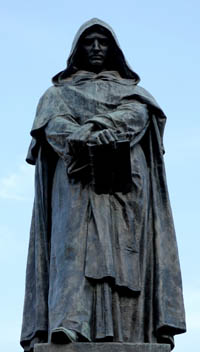  Giordano
Bruno was a sixteenth century pantheist. He identified God with
the Universe. He saw the divine everywhere, in every grain of
sand, in all life, in the stars, in the infinite Universe. For
him, God was the soul of the Universe. He thought that Aristotle
had been wrong, and that existing Christian denominations were
petty and narrow. For such heresies he was kept in prison for
seven years, examined by a number of cardinals, condemned by
a meeting presided over by the Pope, and burned at the stake
in Rome in 1600. The precise charges against him have disappeared
from Church records. Giordano
Bruno was a sixteenth century pantheist. He identified God with
the Universe. He saw the divine everywhere, in every grain of
sand, in all life, in the stars, in the infinite Universe. For
him, God was the soul of the Universe. He thought that Aristotle
had been wrong, and that existing Christian denominations were
petty and narrow. For such heresies he was kept in prison for
seven years, examined by a number of cardinals, condemned by
a meeting presided over by the Pope, and burned at the stake
in Rome in 1600. The precise charges against him have disappeared
from Church records.
A monk called Lucilio (or Julius) Vanini was also a sceptical-minded
humanist. He made the mistake of referring to nature as the
"Queen of the Universe" and was tried by the Parliament
at Toulouse. He was convicted of atheism and blasphemy in 1619.
His tongue was pulled with pincers and then severed. He was
garrotted
and his body burned at the stake5.
In the Netherlands, pantheist ideas were argued by the philosopher
Spinoza, who attracted violent reaction from both Christians
and Jews. Although pantheists would continue to be executed
as blasphemers, Spinoza made pantheism respectable, at least
among educated humanists, who soon started asking themselves
about doctrines such as the Incarnation and the Trinity.
Unitarians
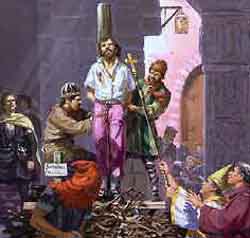  During
the Enlightenment, scholars became aware that the concept of
the Trinity had developed over hundreds of years, that its only
explicit mention in the Bible was a fraudulent insertion, and
that many early Christians had denied Jesus' divinity. These
scholars adopted, or returned to, the belief that there is a
single God — or rather (in theological-speak) that God
has one person rather than three persons.
They are thus known as Unitarians (as opposed to mainstream
Trinitarians). But to question either the Incarnation
or the Trinity was regarded as blasphemous, and therefore deserving
of death, a position held by Roman Catholics and Protestants
alike. Michael Servetus (1511-1553), the famous anatomist, was
perhaps the first Unitarian to be burned to death for his views.
He had narrowly escaped the Inquisition, only to be arrested
by Protestants in Geneva. Despite a safe conduct, he was sent
to the stake by Calvin. During
the Enlightenment, scholars became aware that the concept of
the Trinity had developed over hundreds of years, that its only
explicit mention in the Bible was a fraudulent insertion, and
that many early Christians had denied Jesus' divinity. These
scholars adopted, or returned to, the belief that there is a
single God — or rather (in theological-speak) that God
has one person rather than three persons.
They are thus known as Unitarians (as opposed to mainstream
Trinitarians). But to question either the Incarnation
or the Trinity was regarded as blasphemous, and therefore deserving
of death, a position held by Roman Catholics and Protestants
alike. Michael Servetus (1511-1553), the famous anatomist, was
perhaps the first Unitarian to be burned to death for his views.
He had narrowly escaped the Inquisition, only to be arrested
by Protestants in Geneva. Despite a safe conduct, he was sent
to the stake by Calvin.
The burning of Unitarians caused public unease in England,
even in the sixteenth century. Further disquiet was expressed
in 1612 when Unitarians were burned in London and Lichfield.
But the established Church, the Church of England, was adamant.
Unitarianism was blasphemous. In 1648 an Act was passed that
specifically prescribed the death penalty for Unitarian and
atheist beliefs, both of which were again classified as blasphemous6.
Few prosecutions were brought because Unitarians tended to be
thoughtful and well educated — which meant that they were
generally also rich, influential and intelligent enough to be
discreet.
Religious doubt was by now common amongst the educated classes.
Thomas Hobbes came as close to being an unbeliever as was then
possible while keeping his life. He seems to have been largely
responsible for an explosion of atheism among the upper classes
in the mid-seventeenth century — and some who could not
countenance outright atheism became pantheists. Voltaire was
surprised by widespread atheism in England in 1730. Unitarianism
also flourished in the upper reaches of society. Men like Isaac
Newton (1642-1727), who lived while the 1648 Act was still on
the statute books, were obliged to conceal their Unitarian leanings.
Isaac Newton wanted to be certain that he practiced
Christianity in its original intended form. When he
cross-referenced translations of the Bible he noted
a number of disparities, including a major discrepancy
in the fifth chapter of the First Epistle of John. The
King James version of it reads: "For there are
three that bear record in heaven, the Father, the Word,
and the Holy Ghost: and these three are one." This
sentence provides the foundation of the essential Christian
doctrine of the Trinity. Newton noticed that none of
the earlier Greek versions included this assertion.
He searched the rest of the Bible for evidence of the
Trinity but found no trace of it. Instead, he found
evidence against it. Newton therefore rejected the doctrine
of the Trinity and wrote up an argument making twelve
points why the doctrine was unwarranted. He contended
that the Church had erred in its interpretation of Christianity.
After Newton's death, his twelve point argument was
discovered along with his theological and alchemical
works. His argument was correct (the passage was indeed
a late Christian insertion designed to justify the doctrine
of the Trinity), but denial of the Trinity was considered
heresy by the Anglican Church in his lifetime. So Newton's
writings were placed in a box with the words "not
fit to be published" marked on it. John Maynard
Keynes purchased Newton's papers in 1936, discovered
Newton's secret beliefs and made them public.
|
| |
John Locke (1632-1704) was fortunate to escape prosecution
in 1695 for his Unitarian views. The poet John Milton (1608-1674)
also kept his Unitarian views to himself during his lifetime.
Joseph Priestley had his laboratory destroyed by a mob shouting
“for Church and King”. He left England for North
America, where Unitarianism was the religion of the educated
élite. Harvard University, for example, was largely Unitarian,
prompting the sneer that its preaching was limited to the fatherhood
of God, the brotherhood of man and the neighbourhood of Boston.
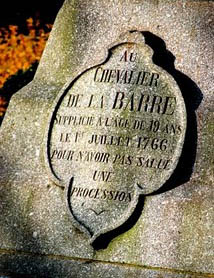  In
England, a new Blasphemy Statute was passed in 1698 to protect
Christianity from criticism. Under the Act it was an offence
to deny the truth of Christianity or any of the persons of Trinity.
Penalties included loss of civil rights and imprisonment. Prosecutions
continued. In 1763 John Wilkes, the parliamentary reformer,
was charged with blasphemy, along with a number of other offences.
In continental Europe the Church had a stronger grip than in
Britain. In 1766 a young Frenchman, Jean-François
de la Barre, was accused of singing irreligious songs, mocking
a religious icon, damaging a crucifix, and failing to remove
his hat while a religious procession passed in Abbeville. He
was sentenced to "the torture ordinary and extraordinary",
to have his tongue cut out, to have his right hand cut off,
and to be burned at the stake. Voltaire fought for his life
and the case was referred to the French Parliament. The clergy
insisted on the death penalty. The boy was tortured, then beheaded,
and his body was burned along with a copy of Voltaire's Philosophical
Dictionary. Charles Dickens was scathing about it, writing
almost a century later about France: In
England, a new Blasphemy Statute was passed in 1698 to protect
Christianity from criticism. Under the Act it was an offence
to deny the truth of Christianity or any of the persons of Trinity.
Penalties included loss of civil rights and imprisonment. Prosecutions
continued. In 1763 John Wilkes, the parliamentary reformer,
was charged with blasphemy, along with a number of other offences.
In continental Europe the Church had a stronger grip than in
Britain. In 1766 a young Frenchman, Jean-François
de la Barre, was accused of singing irreligious songs, mocking
a religious icon, damaging a crucifix, and failing to remove
his hat while a religious procession passed in Abbeville. He
was sentenced to "the torture ordinary and extraordinary",
to have his tongue cut out, to have his right hand cut off,
and to be burned at the stake. Voltaire fought for his life
and the case was referred to the French Parliament. The clergy
insisted on the death penalty. The boy was tortured, then beheaded,
and his body was burned along with a copy of Voltaire's Philosophical
Dictionary. Charles Dickens was scathing about it, writing
almost a century later about France:
Under the guidance of her Christian pastors, she [France]
entertained herself, besides, with such humane achievements
as sentencing a youth to have his hands cut off, his tongue
torn out with pincers, and his body burned alive, because
he had not kneeled down in the rain to do honour to a dirty
procession of monks which passed within his view, at a distance
of some fifty or sixty yards.
( From the opening pages of A Tale of Two Cities
(1859))
Deism
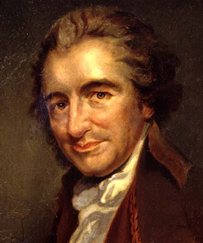  In
the late seventeenth century philosophers developed a theory
known as deism, the most important form of which asserted that
God did indeed exist, and had created the world, but he had
simply set it going, and then left it to its own devices. In
particular, he no longer interfered with human affairs. It was
as though he had wound up the Universe like a clockwork toy,
then gone away and left it running. This has been described
as atheism with God. To conventional churchmen it was
atheism cleverly dressed up to avoid prosecution. Whether or
not its proponents honestly believed it, and whether or not
they were really atheists, we have no way of knowing. If it
was a ruse, it didn't work, because early deists were burned
at the stake or otherwise executed as blasphemers. In
the late seventeenth century philosophers developed a theory
known as deism, the most important form of which asserted that
God did indeed exist, and had created the world, but he had
simply set it going, and then left it to its own devices. In
particular, he no longer interfered with human affairs. It was
as though he had wound up the Universe like a clockwork toy,
then gone away and left it running. This has been described
as atheism with God. To conventional churchmen it was
atheism cleverly dressed up to avoid prosecution. Whether or
not its proponents honestly believed it, and whether or not
they were really atheists, we have no way of knowing. If it
was a ruse, it didn't work, because early deists were burned
at the stake or otherwise executed as blasphemers.
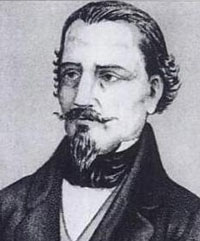  Cayetano
Ripoll was a nineteenth century schoolmaster in Valencia, Spain.
He was accused by the Spanish Inquisition of being a deist and
of teaching his students about deism. He was arrested for heresy,
and convicted. The Inquisition demanded that Ripoll be burned
at the stake for his heresy, but the civil authorities chose
to garrote
him instead, and he was executed on 26 July 1826. Cayetano
Ripoll was a nineteenth century schoolmaster in Valencia, Spain.
He was accused by the Spanish Inquisition of being a deist and
of teaching his students about deism. He was arrested for heresy,
and convicted. The Inquisition demanded that Ripoll be burned
at the stake for his heresy, but the civil authorities chose
to garrote
him instead, and he was executed on 26 July 1826.
The Church authorities, upset that Ripoll had not been burned
at the stake, placed his body in a barrel and painted flames
on it, like a heretic's sanbenito. According to some sources
churchmen then buried the barrel in unconsecrated ground. Other
sources state that they burned the barrel, throwing the ashes
into a river (in line with their traditional practice). Ripoll
is the last known Deist victim of the .Spanish
Inquisition.
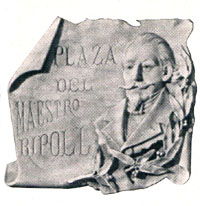  Rich,
educated and powerful deists flourished while others, less well
connected, went in fear of execution In the 1720s Thomas Woolston
was put under house arrest for the remainder of his life for
voicing doubts about the Resurrection and other Bible stories.
The deist Thomas Paine, who was not so well connected, was obliged
to flee the country after being outlawed in 1792 (following
the publication of his Rights of Man). He was therefore
not personally available for prosecution for blasphemous libel
when The Age of Reason was published. Rich,
educated and powerful deists flourished while others, less well
connected, went in fear of execution In the 1720s Thomas Woolston
was put under house arrest for the remainder of his life for
voicing doubts about the Resurrection and other Bible stories.
The deist Thomas Paine, who was not so well connected, was obliged
to flee the country after being outlawed in 1792 (following
the publication of his Rights of Man). He was therefore
not personally available for prosecution for blasphemous libel
when The Age of Reason was published.
Although famous and influential people tended to escape prosecution,
they were still persecuted in various ways. Adam Smith and David
Hume, for example, suffered for their known scepticism. Hume
was denied the chair of moral philosophy at Glasgow because
of "the violent and solemn remonstrance of the clergy".
In France, Denis Diderot was imprisoned in 1749 for his Lettre
sur les Aveugles and lived under constant threat of persecution
for his Encyclopédie.
Explicit Atheism
Outright atheism had been known in ancient Greece. Some of
the best known philosophers in the ancient world had been atheists.Before
Christianity appeared, many educated Romans were also atheists,
regarding all gods, including the Christian one, as man-made.
  People
in Islamic countries were also able to express their atheism
in medieval times. The blind Syrian Poet Abul 'Ala Al-Ma'arri
taught that religion was a "fable invented by the ancients",
worthless except to those who exploit the credulous masses. People
in Islamic countries were also able to express their atheism
in medieval times. The blind Syrian Poet Abul 'Ala Al-Ma'arri
taught that religion was a "fable invented by the ancients",
worthless except to those who exploit the credulous masses.
Do not suppose the statements of the prophets to be true;
they are all fabrications. Men lived comfortably till they
came and spoiled life. The sacred books are only such a set
of idle tales as any age could have and indeed did actually
produce.
cited by James Hastings, Encyclopedia of Religion and Ethics,
Part 3, Kessinger Publishing, page 190
His religious scepticism and antireligious views are famously
expressed in a poem which states "The inhabitants of the
earth are of two sorts: those with brains, but no religion,
and those with religion, but no brains."
Christianity would not countenance such ideas. Atheism was
plainly blasphemous, which meant that atheists could expect
to die unpleasant deaths if they admitted to their lack of belief.
Those original enough to work out their own atheist ideas were
generally intelligent enough to keep their ideas to themselves,
although there were occasional exceptions. In Ireland Adam Duff
O'Toole espoused views that had been common in early times but
seemed blasphemous in the fourteenth century: he denied the
Trinity, doubted the Virgin Birth, and regarded Bible stories
as fables. For these beliefs he was burned alive in Dublin in
1327.
Pomponio Algerio, a youth of Nola, had studied at Padua. He
was accused of heresy and Atheism. He was burnt alive in a cauldron
of boiling oil, pitch, and turpentine at Rome in 1566
|
Pomponio Algerio shown here having boiling
pitch poured over him
|
|
|
  The
Church had suppressed many beliefs that had been held by early
followers of Jesus, or by his critics. Somehow these beliefs
survived and emerged again and again throughout the centuries.
These claims struck conventional Christians as highly offensive:
the Bible was a fiction; the Trinity was an unwarranted innovation;
Jesus had been not God incarnate but an ordinary, if illegitimate
and homosexual, man; far from being divine his father was either
a Roman centurion or a pimp; Mary had not been a virgin but
a prostitute; conventional Christianity was an imposition. All
of these views dated from early times, and survived down the
centuries, even though those caught repeating them could expect
death. Christopher Marlowe, the poet and dramatist, was one
of many who echoed the ancient charges. He commented that the
angel Gabriel had been a bawd (i.e. pimp) for the Holy Ghost.
He held that Jesus had been a bastard and a homosexual, and
noted that the New Testament was "filthily written".
He was facing a charge of atheism when he was murdered in mysterious
circumstances in 1593. The
Church had suppressed many beliefs that had been held by early
followers of Jesus, or by his critics. Somehow these beliefs
survived and emerged again and again throughout the centuries.
These claims struck conventional Christians as highly offensive:
the Bible was a fiction; the Trinity was an unwarranted innovation;
Jesus had been not God incarnate but an ordinary, if illegitimate
and homosexual, man; far from being divine his father was either
a Roman centurion or a pimp; Mary had not been a virgin but
a prostitute; conventional Christianity was an imposition. All
of these views dated from early times, and survived down the
centuries, even though those caught repeating them could expect
death. Christopher Marlowe, the poet and dramatist, was one
of many who echoed the ancient charges. He commented that the
angel Gabriel had been a bawd (i.e. pimp) for the Holy Ghost.
He held that Jesus had been a bastard and a homosexual, and
noted that the New Testament was "filthily written".
He was facing a charge of atheism when he was murdered in mysterious
circumstances in 1593.
  Sir
Walter Raleigh, a suspected atheist, was condemned to be hanged,
drawn and quartered in 1604, not only for treason but also for
holding "the most heathenish and blasphemous opinions".
In fact, he was beheaded instead. Alexander Agnew of Dumfries
(known as Jock of Broad Scotland) held that the Bible was false.
There was no God, no Christ, no Heaven or Hell, and no human
soul. There was only nature. For these beliefs he was hanged
from a gibbet on 21 st May 1651. In 1675 John Taylor of Surrey
was accused of blasphemy and brought before the House of Lords.
He had uttered a number of blasphemies, including the ancient
charge that religion was a cheat and "the virgin Mary was
a whore and Jesus Christ was a bastard". The Lords were
reluctant to be heavy-handed because of memories of the James
Naylor case twenty years earlier, when the Commons had harshly
punished an eccentric Quaker (see page 341). Naylor's treatment
had generated public sympathy, and the Lords did not want to
make the same mistake. They locked John Taylor up in Bedlam
on a diet of bread and water, supplemented by "bodily corrections".
In 1676, he was sent to trial before the King's Bench, where
he received a relatively lenient sentence from Matthew Hale,
the Lord Chief Justice (a fine of 1000 marks, which he could
not possibly pay, ensuring that he would spend the rest of his
life in prison). This case established that Christianity was
part of the laws of England. From now on blasphemy would be
recognised as a common law offence, and Rex v Taylor
could be cited as a precedent in any jurisdiction that recognised
the English common law. Sir
Walter Raleigh, a suspected atheist, was condemned to be hanged,
drawn and quartered in 1604, not only for treason but also for
holding "the most heathenish and blasphemous opinions".
In fact, he was beheaded instead. Alexander Agnew of Dumfries
(known as Jock of Broad Scotland) held that the Bible was false.
There was no God, no Christ, no Heaven or Hell, and no human
soul. There was only nature. For these beliefs he was hanged
from a gibbet on 21 st May 1651. In 1675 John Taylor of Surrey
was accused of blasphemy and brought before the House of Lords.
He had uttered a number of blasphemies, including the ancient
charge that religion was a cheat and "the virgin Mary was
a whore and Jesus Christ was a bastard". The Lords were
reluctant to be heavy-handed because of memories of the James
Naylor case twenty years earlier, when the Commons had harshly
punished an eccentric Quaker (see page 341). Naylor's treatment
had generated public sympathy, and the Lords did not want to
make the same mistake. They locked John Taylor up in Bedlam
on a diet of bread and water, supplemented by "bodily corrections".
In 1676, he was sent to trial before the King's Bench, where
he received a relatively lenient sentence from Matthew Hale,
the Lord Chief Justice (a fine of 1000 marks, which he could
not possibly pay, ensuring that he would spend the rest of his
life in prison). This case established that Christianity was
part of the laws of England. From now on blasphemy would be
recognised as a common law offence, and Rex v Taylor
could be cited as a precedent in any jurisdiction that recognised
the English common law.
Casimir Liszinski was a Pole of noble birth. Among the statements
in Liszinski’s papers was that man was the creator of God,
whom he had formed out of nothing. He was denounced as an Atheist
in 1688 by the Bishop of Wilna and Posnovia, he was decapitated
and burnt at Grodno on 30 March, 1689. His ashes were placed
in a cannon and scattered.
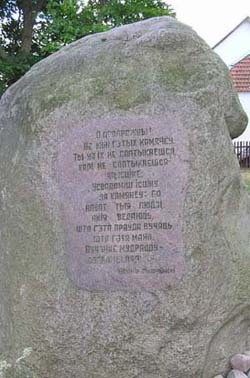  Atheism
was something of an intellectual problem for Church scholars.
Although men like Hobbes, Spinoza and Paine never claimed to
be atheists, Christian apologists nevertheless described them
as such. This seems to have been the first time that the Church
had fully countenanced the reality of atheism since it had eliminated
it from the educated classes of the Roman Empire many centuries
earlier7. The
idea of it was apparently seen as such a threat that Christians
in the eighteenth century started to proclaim that there could
be no such thing as atheism. It was literally unthinkable that
there was no God. Scholars debated whether there were, or had
ever been, any genuine atheists. Atheism seemed so perverse,
so bizarre, that a prevalent view in Britain was that atheism
simply could not exist8.
Lord Hardwicke's Act of 1754, which did away with traditional
secular marriages in England, made no provision for the marriage
of atheists. Nevertheless the theoretical impossibility of atheism
did not prevent Christians executing philosophers like Kazimierz
Lyszczynski (or Casimir Liszinski) for the crime of atheism. Atheism
was something of an intellectual problem for Church scholars.
Although men like Hobbes, Spinoza and Paine never claimed to
be atheists, Christian apologists nevertheless described them
as such. This seems to have been the first time that the Church
had fully countenanced the reality of atheism since it had eliminated
it from the educated classes of the Roman Empire many centuries
earlier7. The
idea of it was apparently seen as such a threat that Christians
in the eighteenth century started to proclaim that there could
be no such thing as atheism. It was literally unthinkable that
there was no God. Scholars debated whether there were, or had
ever been, any genuine atheists. Atheism seemed so perverse,
so bizarre, that a prevalent view in Britain was that atheism
simply could not exist8.
Lord Hardwicke's Act of 1754, which did away with traditional
secular marriages in England, made no provision for the marriage
of atheists. Nevertheless the theoretical impossibility of atheism
did not prevent Christians executing philosophers like Kazimierz
Lyszczynski (or Casimir Liszinski) for the crime of atheism.
  Christians
continued to assert that atheism could not exist during the
entire course of the century, although it became increasingly
possible for influential people to admit to being atheists without
suffering the full force of the law. Atheism became a sort of
open secret. In 1770 Baron d'Holbach had become the first person
in Christendom to dare to publish an openly atheistic work9.
When David Hume mentioned at a dinner given by d'Holbach that
he had never seen an atheist, the Baron pointed out that there
were fifteen of them among the eighteen at the table. By 1781
a man called William Hammon felt safe enough to try to publicly
dispel remaining doubts in Britain about the existence of atheists:
" ...as to the question whether there is such an existent
Being as an atheist, to put that out of all manner of doubt,
I do declare upon my honour that I am one"10. Christians
continued to assert that atheism could not exist during the
entire course of the century, although it became increasingly
possible for influential people to admit to being atheists without
suffering the full force of the law. Atheism became a sort of
open secret. In 1770 Baron d'Holbach had become the first person
in Christendom to dare to publish an openly atheistic work9.
When David Hume mentioned at a dinner given by d'Holbach that
he had never seen an atheist, the Baron pointed out that there
were fifteen of them among the eighteen at the table. By 1781
a man called William Hammon felt safe enough to try to publicly
dispel remaining doubts in Britain about the existence of atheists:
" ...as to the question whether there is such an existent
Being as an atheist, to put that out of all manner of doubt,
I do declare upon my honour that I am one"10.
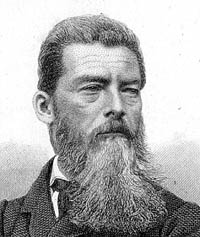  It
was not until around 1830 that more than a few isolated people
dared to profess open and explicit atheism at all. Early claimants
included Feuerbach, Nietzsche and Marx. All suffered from Christian
intolerance in various forms. It might be possible to be an
atheist and live, but publicising the fact could still invite
problems. As an undergraduate at University College, Oxford,
the poet Shelley had published a pamphlet entitled The Necessity
of Atheism in 1811. He escaped prosecution because of his
family background and the fact that the pamphlet was successfully
suppressed, but he was sent down from the university for it. It
was not until around 1830 that more than a few isolated people
dared to profess open and explicit atheism at all. Early claimants
included Feuerbach, Nietzsche and Marx. All suffered from Christian
intolerance in various forms. It might be possible to be an
atheist and live, but publicising the fact could still invite
problems. As an undergraduate at University College, Oxford,
the poet Shelley had published a pamphlet entitled The Necessity
of Atheism in 1811. He escaped prosecution because of his
family background and the fact that the pamphlet was successfully
suppressed, but he was sent down from the university for it.
Publishing radical ideas was also felt to warrant severe punishment.
When a publisher reprinted some of Thomas Paine's writings in
1812, he was imprisoned and pilloried. But times were changing:
instead of attacking him in his pillory, the public applauded
him. The public would not now tolerate death sentences for atheism,
and using the law at all to curb free thought often resulted
in positive publicity for the cause of the godless. Prosecutions
of sceptics for blasphemy were almost always successful, but
the prosecution of men and women for honestly held views only
served to propagate their arguments. As more and more people
heard the evidence, more and more became sceptical. As it has
always done, the creation of martyrs helped their cause enormously.
Each new case put one or two sceptics out of circulation but
resulted in the conversion of hundreds or thousands.
Thomas Paine's The Age of Reason has never been out
of print, and is still seen as a danger by the mainstream Churches.
In the nineteenth century William Wilberforce, Vice-President
of the Society for Suppressing Vice, organised prosecutions
against both publishers and sellers of it. Richard Carlile was
prosecuted in 1819 for republishing the works of Paine and others.
He suffered huge fines that he could not possibly pay and was
imprisoned as a result. Despite his business premises being
repeatedly ransacked, his wife Jane continued to edit his magazines
and publish his books, until she was also imprisoned (along
with her baby) in 1821. Carlile's sister Mary Anne then took
over. When she was imprisoned as well, a succession of others
took over. Scores were prosecuted, but support came from all
over the country. The law was falling into disrepute.
Without the fear of torture and death people were now more
willing to break the law. Most who did so used pure reason,
but some were more liberal in their approach. Charles Haslam
described the Bible as a vile compound of filth, blasphemy and
nonsense; as a fraud and a cheat. It would, he said, disgrace
orang-utans, let alone men. Its author must have been a random
idiot, and people should burn it "in order that posterity
may never know we believed in such abominable trash". When
the authorities investigated, the author could not be found,
so his publishers were prosecuted in his stead11.
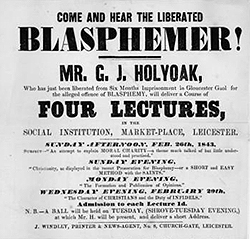  Despite
the combative position of people like Haslam, public opinion
continued to become more liberal and sympathetic to secular
ideas. After voicing uncomplimentary views about Christianity
and colonisation in 1842, George Holyoake was imprisoned. While
he was in gaol his daughter died of starvation. The public had
by now had enough, and prosecutions dried up. Christian vigilante
organisations tried private prosecutions, but they failed to
win the verdicts they wanted. No serious work of literature
would be successfully prosecuted in England for blasphemy for
well over 100 years — until 1979, when the Christian cause
found a new champion in Mrs Mary Whitehouse. Despite
the combative position of people like Haslam, public opinion
continued to become more liberal and sympathetic to secular
ideas. After voicing uncomplimentary views about Christianity
and colonisation in 1842, George Holyoake was imprisoned. While
he was in gaol his daughter died of starvation. The public had
by now had enough, and prosecutions dried up. Christian vigilante
organisations tried private prosecutions, but they failed to
win the verdicts they wanted. No serious work of literature
would be successfully prosecuted in England for blasphemy for
well over 100 years — until 1979, when the Christian cause
found a new champion in Mrs Mary Whitehouse.
The British authorities still had the option of using the Press
Acts, which had been framed to suppress radical publications
like those of Carlile. In the 1860s the government acted against
Charles Bradlaugh, requiring large sureties against the possibility
that his weekly publication National Reformer might
print something blasphemous or seditious — although he
had never published material warranting prosecution. He soon
incurred penalties of millions of pounds for failing to raise
the required sureties. Once again the law was falling into disrepute,
and as a result the Press Acts were repealed in 1869.
The treatment of Bradlaugh showed up other problems with the
law. According to a judgement handed down by Lord Justice Sir
Edward Coke (1552-1634) unbelievers ("infidels") had
no rights at all in law. Thus for example, contracts with them
need not be kept and debts need not be paid. "All infidels
are in law perpetui inimici; for between them, as with
devils whose subjects they be, and the Christian, there is perpetual
hostility.... ". This still represented the law in the
nineteenth century. When Bradlaugh had been prosecuted in the
1860s, his atheism had been held to amount to sedition. Since
he did not believe in God he was not permitted to give evidence
in court. This problem was resolved by the Evidence Amendment
Act of 1869, which allowed atheists to affirm. But a similar
problem arose when Bradlaugh was elected to the House of Commons
in 1880. When he tried to take his seat, he was prevented from
taking the oath that all new Members of Parliament were required
to take, and excluded from the House. Several times he was re-elected
and each time the Speaker excluded him from the House, even
though he was willing to take the oath. He finally took his
seat years later under a new Speaker, and the law was subsequently
changed by the Parliamentary Oaths Act of 1885. Similar restrictions
in Scotland were removed by another Oaths Act in 1888.
|
Charles Darwin provides an interesting
case study in changing nineteenth century beliefs. He
was originally a believer and destined for the priesthood,
but lost his faith after discovering the Theory of Evolution.
He was careful to keep his views to himself, partly to
avoid contention and partly because of his wife's strong
Christian beliefs. He was nevertheless widely accused
of being an atheist. In the twenty first century, many
Christians have been keen to reclaim him as a believer,
perhaps in order to emphasise the modern synthesis by
which educated Christians are able to accept the reality
of evolution by natural selection. Unfortunately for them,
Darwin's private correspondence confirms his atheism in
his later years.
|
| |
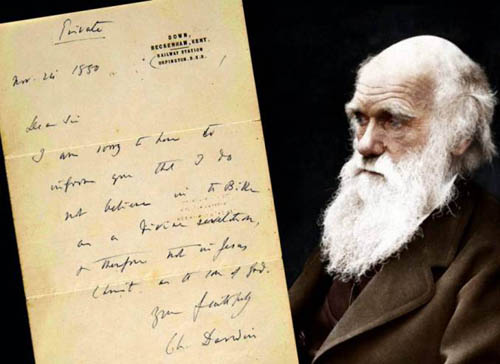 |
|
In November 1880, Darwin received a request
from a young barrister named FA McDermott. "If I
am to have the pleasure of reading your books," McDermott
wrote, "I must feel that at the end I shall not have
lost my faith in the New Testament. My reason in writing
to you therefore is to ask you to give me a Yes or No
to the question Do you believe in the New Testament."
Darwin's reply, dated 24 November 1880
was: "Dear Sir, I am sorry to have to inform you
that I do not believe in the Bible as a divine revelation
& therefore not in Jesus Christ as the son of God.
Yours faithfully. Ch. Darwin.
That letter was auctioned at Bonhams
in New York on 21 September 2015, and sold for $197,000
|
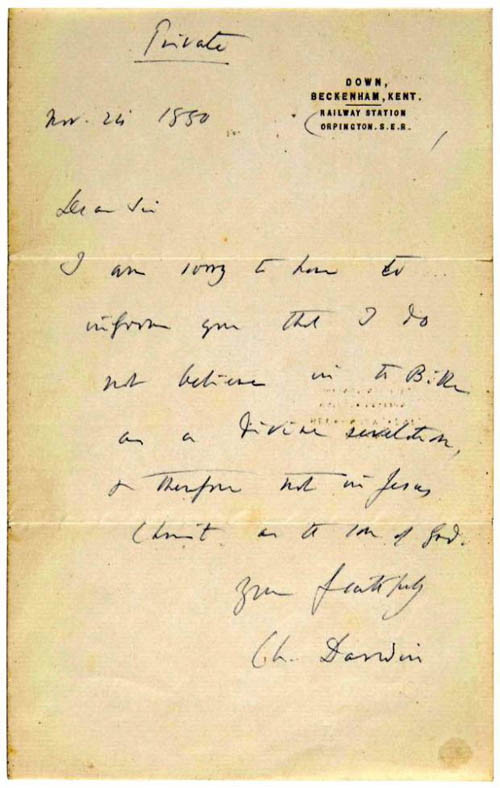 |
| |
The last vestiges of persecution and discrimination were disappearing.
Open agnosticism also became possible. T. H. Huxley coined the
word in 1868, originally to express the idea that if there was
a God, he was unknowable, but agnosticism has now come
to denote the state of being undecided about whether God exists.
In the twentieth century, for the first time since pre-Christian
times, anyone could safely espouse agnosticism or atheism, although
the Blasphemy Statute of 1698 survived until recent times. The
clause about the Trinity had already been rescinded in 1813,
and the rest of Act was quietly repealed in 1967.
Many Christians now espouse views that were once blasphemous
and that people were burned for. Examples are denying the inerrency
of the Bible, denying the Virgin Birth, and doubting the Resurrection.
Many clergymen share these views but most are wary of expressing
them too freely. Blasphemy is still an offence at common law,
and sceptics still run the risk of prosecution. It was only
in the most indirect way that Monty Python's Life of Brian,
a film released in the 1980s, could hint at the ancient traditions
concerning Jesus' parentage.
Blasphemy laws exist in many European countries and in some
states of the supposedly secular USA. The founding fathers of
the USA had been heavily influenced by eighteenth century deism
and rationalism, and these influences ensured that the Constitution
of the USA was firmly secular. Even so, the Constitution could
easily be circumvented. As already mentioned, the case of Rex
v Taylor in 1676 stated that blasphemy was a common law
offence, and this precedent was to be cited not only in England
but also in America — since the English common law carried
over to the common law of the USA. Courts in New York, Pennsylvania
and Delaware have all agreed that blasphemy was a criminal offence
under the common law.
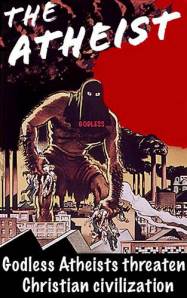  Like
England, colonial America had blasphemy statutes as well as
the common law. They punished atheists and blasphemers in much
the same way as the mother country. Offenders were sometimes
executed, sometimes flogged. Sometimes they were pilloried as
well. Their tongues were bored with hot irons, bodkins or stilettos.
Ears were cropped, noses split, and faces branded. In Maryland
profane words concerning the Holy Trinity were punishable by
torture, branding and ultimately death. As in England, atheists
were not permitted to testify in court, and so were effectively
debarred from filing both civil suits and criminal charges,
and were thus denied access to justice. The Supreme Court of
Tennessee made the following statement in 1871: Like
England, colonial America had blasphemy statutes as well as
the common law. They punished atheists and blasphemers in much
the same way as the mother country. Offenders were sometimes
executed, sometimes flogged. Sometimes they were pilloried as
well. Their tongues were bored with hot irons, bodkins or stilettos.
Ears were cropped, noses split, and faces branded. In Maryland
profane words concerning the Holy Trinity were punishable by
torture, branding and ultimately death. As in England, atheists
were not permitted to testify in court, and so were effectively
debarred from filing both civil suits and criminal charges,
and were thus denied access to justice. The Supreme Court of
Tennessee made the following statement in 1871:
The man who has the hardihood to avow that he does not believe
in a God, shows a recklessness of moral character and utter
want of moral responsibility, such as very little entitles
him to be heard or believed in a court of justice in a country
designated as Christian12.
Atheists have been denied not only legal redress themselves
but also the right to sit on juries. The underlying idea is
that people cannot be trusted unless their morality is conditioned
by a fear of God.
|
From the Detroit News, March 25,
1931
|
|
|
This sort of view survived, even among influential people,
into recent times. Ronald Reagan, while President of the United
States, observed that one could not believe anything the Soviets
said because they did not believe in God.
Atheists are still discriminated against in the courts, for
example in child custody cases where Christian judges have taken
the view that a Christian parent is more likely to be moral
than an atheist one, despite the available evidence13.
In 2010, Cherie Booth QC sitting as a judge in Inner London
Crown Court in England, spared a criminal from prison because
he was religious. Had he been an atheist, he would have been
imprisoned.14.
In 1987 the future president of the USA, George H.W. Bush could
say "I don't know that atheists should be considered as
citizens." Six state constitutions (Arkansas, Maryland,
Mississippi, North Carolina, South Carolina, Tennessee &
Texas) include religious tests that prevent atheists from holding
public office. Organisations like the Boy Scouts excluded atheists
into the twenty first century.
Theologians still wonder whether atheists really exist, though
they tend to be more circumspect in their words than one Jesuit
who opined just a generation ago "…the man who does
not fear God somehow does not exist, and his nature is somehow
not human"15.
|
|
|
|
|
|
|
|
|
|
|
|
|
|
|
|
|
|
|
|
|
|
|
|
|
|
|
|
|
|
|
|
|
|
|
|
|
|
Buy the Book from Amazon.com
|
|
|
|
|
|
Buy the Book from Amazon.co.uk
|
|
|
| |
| |
| More Books |
|
|
|